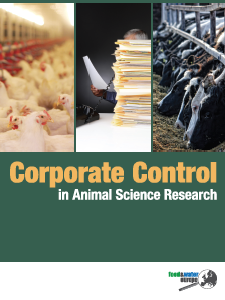Brussels, March 27, 2017 – More than 200 organisations –including Food & Water Europe – have today raised their objections to the planned mergers of six giant agriculture corporations.
The farmer, farmworker, beekeeper, religious, international development, and environmental groups claim that the three resulting companies will concentrate market power and “exacerbate the problems caused by industrial farming – with negative consequences for the public, farmers and farm workers, consumers, the environment, and food security” in an open letter to the European Commission and Competition Commissioner Margrethe Vestager [1]
The European and national organisations – together representing millions of members – state that the proposed mergers of Dow Chemical with DuPont, Monsanto with Bayer AG, and Syngenta with ChemChina will lead to an unacceptable monopoly, with three companies controlling around 70% of the world’s agro-chemicals and more than 60% of commercial seeds.
Ramona Duminicioiu, peasant seed producer of the farmer organization European Coordination Via Campesina said: “Approving these mergers works completely against the rights of peasants, with far reaching effects in our society. When the Commission says that small family farms are the back bone of European agriculture does it honestly believe that or is it just lip service? The already fragile rights of peasants regarding seeds, land and markets risks of being obliterated by these mega-corporations and our Food Sovereignty abducted. The Commission should say no to these mergers!”
Adrian Bebb of Friends of the Earth Europe said: “Europe’s food and farming system is broken and if giant firms, like Monsanto and Bayer, are allowed to merge they will have an even tighter toxic grip on our food. The mergers are a marriage made in hell and should be blocked by regulators. We need to build a fairer and greener food system out of corporate control.”
Arnd Spahn from the European trade unions of agricultural workers EFFAT said: “Workers, as well as the environment and all society, are victims of the use of pesticides. We are fighting for health and safety on work places and we need partners for our ideas. Today the producers of pesticides are big, but after such a merger they will be too big for anybody to bring them on a path to worker and environmental protection. How shall we stop Glyphosate if we have such strong opponents?”
Isabelle Brachet of CONCORD Europe said: “Ending hunger implies addressing power imbalances in our food systems. A small number of multinational corporations dominate internationally traded food systems and get most of the knowledge, benefits and access to decision makers. Corporate power in our food must be restrained – not further extended by mega-mergers. The main investors in agriculture in developing countries are farmers themselves and it is they who must be at the centre of agriculture development policies.”[3]
The organisations have called on the European Commission to reject the mergers, prevent the damage caused by these corporations, and urgently take steps to support just and sustainable food systems less dependent on agri-business.
—
[1] See the letter.



